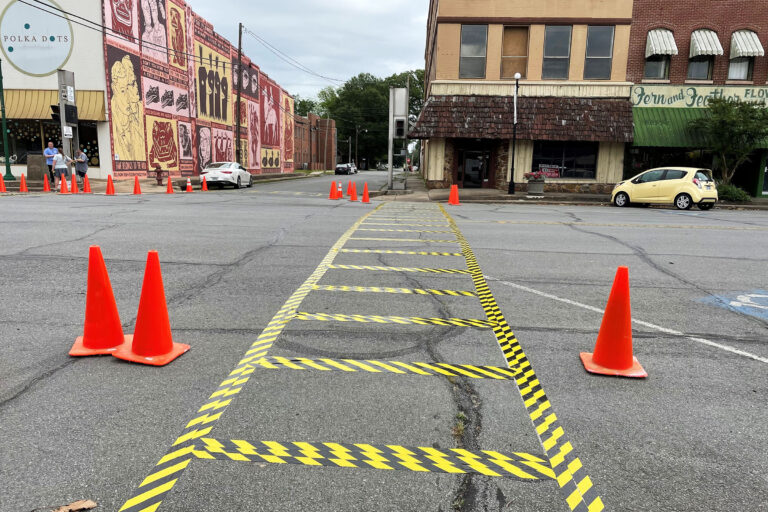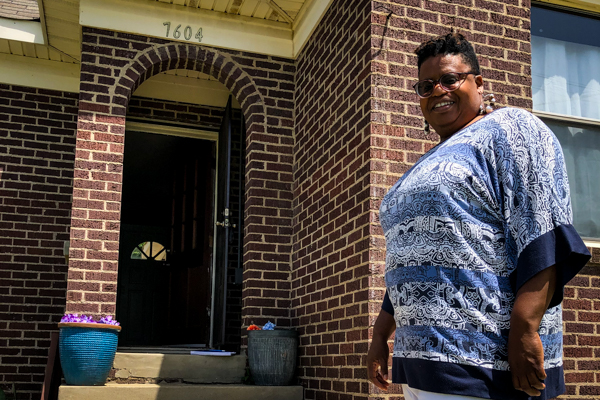
Building inclusive economic and community development ecosystems in the rural South
Vickie Woodard had a great business idea but needed support. She found it by tapping programs implemented by Winrock and other organizations that foster economic growth and improved access to capital.
With the pandemic beginning to enshroud everything and everyplace, including her hometown of England, Ark., Vickie Woodard, retired music teacher, DIYer and aspiring entrepreneur, wondered how she would make it.
“Desperate times call for desperate measures,” she says. “It wasn’t just COVID. It was George Floyd too.” Woodard is a Black woman in her fifties living on a state pension after a nearly 30-year teaching career in public schools. Her primary financial asset was a house bequeathed by her parents in England, a small city located about 25 miles from Little Rock in the Arkansas Delta.
“All I had available was the internet and sheer willpower,” Woodard recalls. But she also had an idea.
The seed of it: Start a local business aimed at battling against the pandemic while taking advantage of fast-growing demand for high-mobility essential workers, especially traveling nurses. That concept, combined with Woodard’s willpower and drive to learn, adapt and do ─ and the prescience to explore unconventional financial and enterprise development resources ─ gave her hope even as the pandemic closed in.
What happened next offers a glimpse into how four different, U.S.-based programs run by Winrock are nurturing the evolution of more inclusive economic ecosystems in the rural South. Those programs include the U.S. Department of Agriculture (USDA)-funded Rural Placemaking Innovation Challenge, the Southern Opportunity and Resilience Fund, the Delta I-Fund, funded by the Delta Regional Authority, and the U.S. Small Business Administration-funded Arkansas Women’s Business Center. These and other U.S. Programs (USP) initiatives implemented by Winrock in collaboration with community leaders, along with other nonprofits and Community Development Financial Institutions (CDFIs), are opening new avenues for small business growth for entrepreneurs like Woodard and others who have traditionally been excluded from opportunities available in other areas.
Woodard says she first became aware of Winrock’s work in the Delta through the England Coalition, a local development group.
Winrock USP Program Officer Jordyn Williams had begun working with coalition leaders and city officials in 2020, supporting community leaders as they brainstormed ways to reimagine and revitalize the town after a decades-long economic slump. Woodard’s involvement in the England Coalition focused on attracting attention and resources to address England’s most pressing needs, including extending broadband internet to residents, improving water infrastructure, and expanding or creating new public parks and green spaces, especially in England’s low-income neighborhoods.
As Woodard says: “I wanted a seat at the table.”
Winrock, England Coalition and city leaders were working together on a community survey to rank the top redevelopment and revitalization priorities of England residents. As Woodard became involved, she realized few residents from low-income neighborhoods in England were responding.
“She was this voice saying, ‘This is great – but how can we bring in people from all parts of town to tell us what they think?’” Williams says. Woodard’s patience and persistence helped to ensure the survey reached everyone. To maximize response rates, she proposed bestowing small prizes to respondents, and donated a gift certificate to a local business to get things going.
The survey results revealed that residents’ top priority was improving local infrastructure such as extending broadband internet and improving water systems management. Expanding pedestrian and cycling access and routes through town, revitalizing the Main Street economic corridor and attracting new businesses, and improving parks and recreation facilities were among other top needs. The survey results were analyzed and shared with support from Winrock, and the city eventually applied for and received a grant to plant trees around a planned rails-to-trails bicycle path. Armed with detailed survey data and inclusive community buy-in, England’s city officials and community leaders are now exploring ways to realize their goals, and have already achieved some, including connecting the town to broadband, an economic lifeline in the new remote-work era.
As her community work unfolded, Woodard was stoking an idea for a pair of rental businesses, both of which involved renovating blighted residential properties to create affordable accommodations for people with critical short-term housing needs, such as essential workers like travel nurses and highway engineers. She inexpensively acquired several houses in England, motivated initially by her desire to help a single, working mom obtain affordable housing. As her Melosong Properties business took shape, she researched the growing demand for mobile medical personnel and sensed an opportunity.
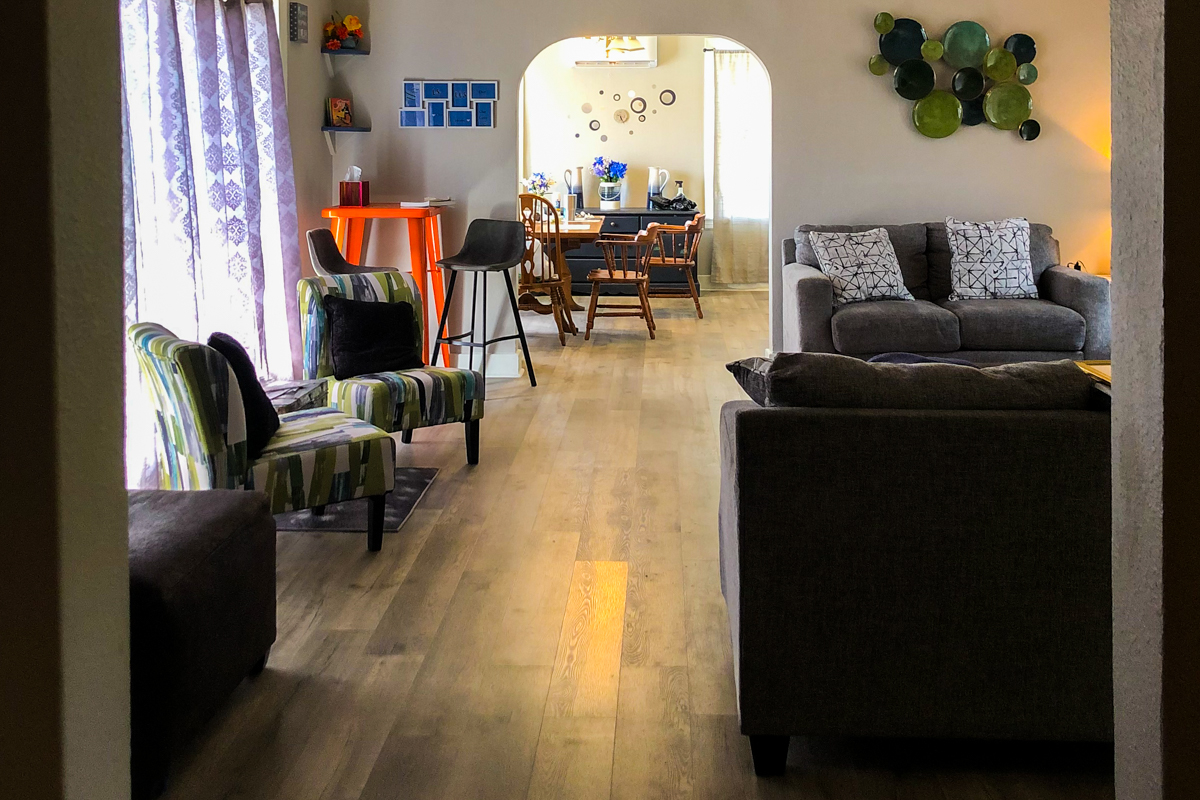
Through previous business support services and coaching Woodard had received through a nonprofit CDFI called Communities Unlimited, Woodard had begun developing and refining a pitch for her idea. She also received help from the Arkansas Small Business Technology and Development Center, and learned about another Winrock-run program: the Arkansas Women’s Business Center (AWBC), which provides training and access to markets and capital for women entrepreneurs in Arkansas as part of a nationwide network. As she explored these and other opportunities, Woodard honed her concept and pitch for Melosong Village, an 11-unit Airbnb venture. Woodard learned about “lean canvas,” a customer-focused, problems-and-solutions approach that helps startup entrepreneurs build out ideas.
“She was a really interesting client because she was trying to work in the temporary short-term market for traveling nurses,” says Chauncey Pettis, AWBC director. Woodard’s concept stood out because it was different from many others: it was a blend of a needs-based service (temporary housing for mobile medical personnel) and an attempt to carve a niche into a platform-based lodgings marketplace.
Woodard entered a pitch competition organized by Communities Unlimited and won. Though the cash prize was small, it carried huge significance: It meant that people who knew something about business thought she knew something, too. The win and associated business development support helped to convince Woodard she was on the right track. She researched and applied to other enterprise development opportunities, obtaining a Walker’s Legacy grant through the Coalition to Back Black Businesses. (Madam C.J. Walker, 1867-1919, was a Black entrepreneur, philanthropist and activist from Louisiana known as the first self-made, female millionaire in the U.S.)
Through her ongoing England Coalition work, Woodard also heard about another Winrock-supported program intended to help entrepreneurs from disenfranchised communities in the rural South access hard-to-find, affordable financing ─ even more critical in the COVID era as thousands of small businesses across the country sputtered or closed.
“The SOAR program is for small business owners who normally can’t get loans through other banks,” Woodard says. “I’m the type of person who should be able to get a [bank] loan, because I have some collateral. But for whatever reason, I couldn’t.”
Through the SOAR Fund loan, she obtained a capital infusion on affordable terms that enabled her to finish renovating her England rentals and move forward on rehabilitating the long-unoccupied units she acquired in Little Rock for her Airbnb project. Woodard carefully selected the site because it’s located in a safe area less than a few minutes’ drive from seven different major medical centers in the state capital.
Designed to boost motivated entrepreneurs like Woodard, SOAR Fund is available to applicants in Alabama, Arkansas, Delaware, Florida, Georgia, Louisiana, Maryland, Mississippi, North Carolina, Oklahoma, South Carolina, Texas, Virginia, West Virginia, and Washington, D.C. The program targets small business owners in historically under-resourced areas, focusing on women and people of color, and provides business services including peer-to-peer learning, credit counseling, accounting and other support. Since its launch in March 2021, the SOAR Fund has issued $32 million in loans to 633 small business owners, according to Calvert Impact Capital, the lead arranger for the fund.
Winrock also helped link Woodard to a rural housing development program called The Housing Assistance Council. “I’m now working … to rehab a fourplex and a small house in my small community. Five families will have like-new housing in a few months!” she says.
The next piece of the puzzle for Woodard was marketing for her Airbnb enterprise. She heard about another Winrock project called Delta I-Fund and applied to it.
“What I learned from I-Fund was the customer segment – knowing how to appeal to my customers. Asking them: ‘What kinds of things could make you come back? What kinds of things can I do better? Help me figure out how I can help you,’” Woodard says. The I-Fund identifies and supports Delta-based entrepreneurs who have innovative ideas, aiming to positively impact economic growth in the region. Woodard received assistance through the program for legal consultation related to her startup.
In the I-Fund program, “We get straight to: ‘Are you providing a service that people will pay for and that people want?’ That’s what customer discovery is,” says Tonitrice Wicks, a Winrock senior program officer. “Vickie was heavily into interviewing traveling healthcare workers to see if this is something that they will pay for and fleshing out those ideas. And it came out that there was a need, and there is interest for that, especially for nurses traveling alone and really needing a space to go where they feel safe.”
Standing in the kitchen of one of her nearly finished Airbnb units – another completed unit has already been successfully rented to a pair of nurses needing month-to-month accommodations – Woodard smooths a hand over one of the marbled, wood-and-epoxy countertops she made herself, and takes a moment. She had just been reflecting on her own history in England as the daughter of a pair of educators; her mother was a teacher, and her father a school principal. Both had been outspoken civil rights activists.
“For me, it’s a matter of legacy,” Woodard explains. “We once had a booming Black community in England – we had teachers like my parents, we had doctors, we had mill workers, we had designers. Trying to get back to those days is difficult, but in small, rural communities, everyone there wants to do something, everyone has a dream. It’s that poverty thing – it has caused so many overlapping issues. It’s like peeling an onion.”
As her business grows, Woodard hopes to peel away a few more layers. She also hopes to inspire Black women entrepreneurs, small business owners and others with innovative ideas in the rural South ─ and encourage them to explore opportunities for community development and economic growth like those offered by Winrock and other organizations.
Related Projects

Southern Opportunity and Resilience Fund
The SOAR Fund is a partnership of local and national community finance organizations created to address the capital needs of historically disenfranchised communities across the South and Southeast U.S. as they attempt to rebuild after the COVID-19 health and economic crisis.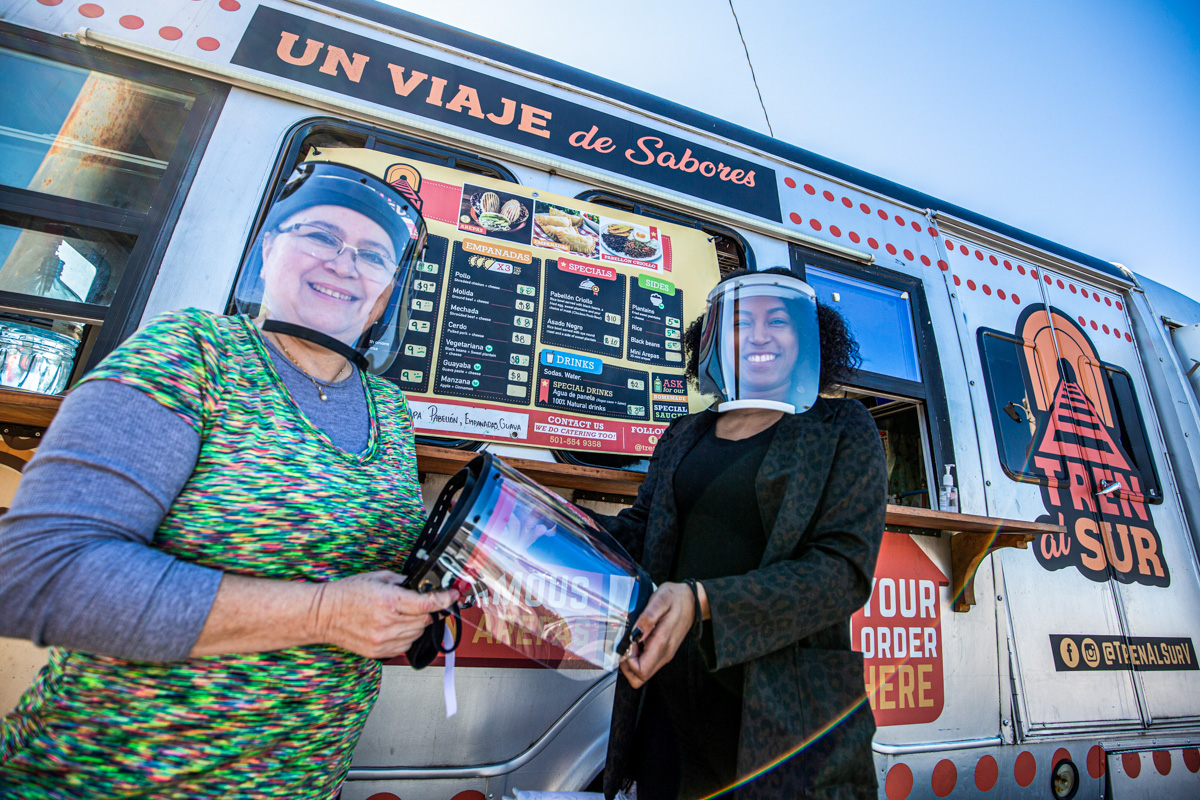
Arkansas Women’s Business Center
AWBC is committed to providing technical assistance, training, and access to capital services tailored to meet the needs of women business owners. The Center is funded in part through a Cooperative Agreement with the U.S. Small Business Administration. It is in a network of over 100 Centers located through the nation. Winrock’s staff and team of […]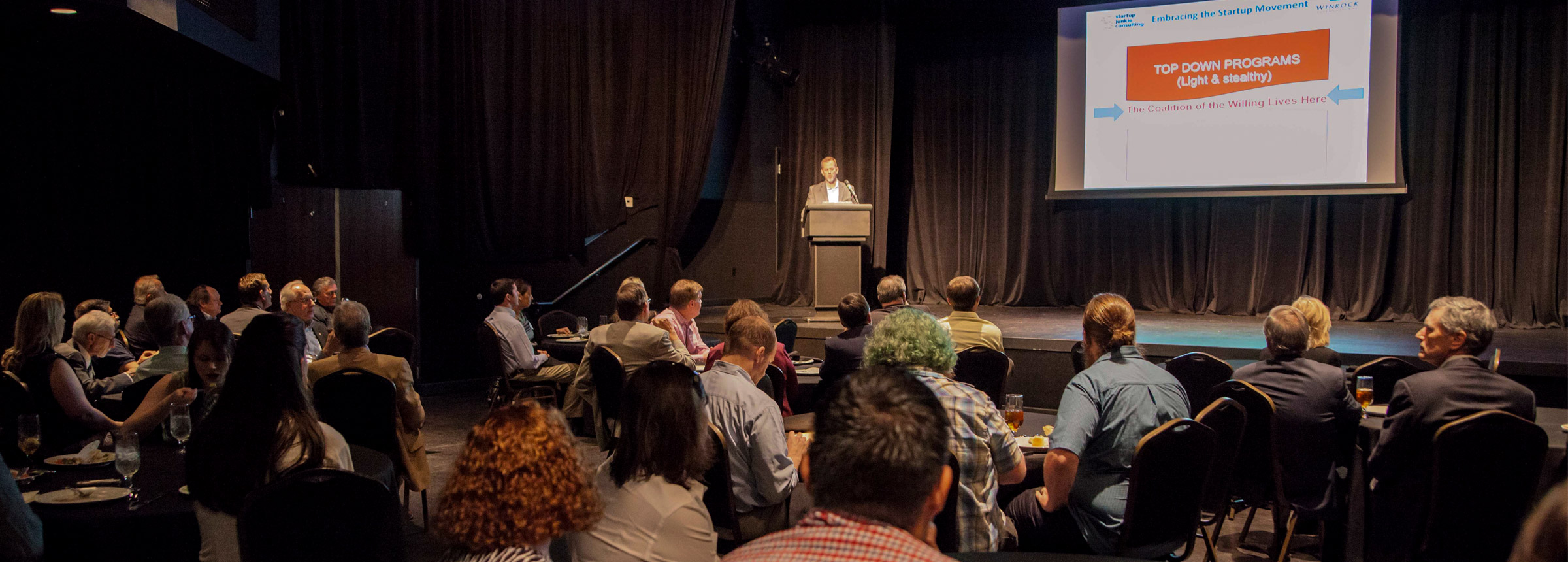
Delta Innovation Fund
Budding entrepreneurs in the Mississippi River Delta region often lack resources crucial to business success — a deficit that discourages job creation, stunts economic growth and perpetuates persistent poverty. To address these issues, the Delta I-Fund program, in partnership with the Delta Regional Authority, trains cohorts of entrepreneurs in successful startup practices, connects them with local…